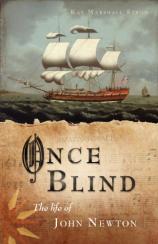Once Blind: The Life of John Newton
About the Book
Once Blind: The Life of John Newton
Today, over two hundred years after John Newton struggled alongside William Wilberforce to bring an end to the African slave trade, three times as many people around the world are living as slaves. When the first abolition bill passed in 1807, four million people were enslaved; today the number is estimated at twelve million. In the new biography, ONCE BLIND (Authentic Publishers), author Kay Marshall Strom skillfully employs the legacy of John Newton to call attention to 21st-century slavery throughout the world.
After years of research into the former slave ship captain’s letters, treatises, journals and church archives, Strom has penned a riveting biographical narrative of Newton, a broken and desperate man whose stirring hymn, “Amazing Grace,” has testified to millions of his transformation from the worst of the worst to a ringing voice for God. His personal accounts of the slave trade and piercing cry for abolition, along with the work of his friend William Wilberforce, helped turn the heart of a nation against the African slave trade to bring it to an end. ONCE BLIND draws readers into Newton’s life in an engaging way few biographies can. Readers are introduced to his troubled childhood, his forced service to the Royal Navy, and God’s pursuit of Newton with relentless love and amazing grace. Newton once told Wilberforce, “There are two things I know in my life. I am a great sinner and Christ is a great savior.”
Strom is convinced her poignant account of John Newton’s fight against slavery two centuries ago is a very relevant call to action for believers today. “Slavers today don’t sail the high seas with chained captives packed into the holds of their ships like in the days of John Newton,” Strom writes. “And they certainly don’t march the slaves out to auction blocks behind the post office and sell them to the highest bidder. Yet when people are owned as property, bought and sold, physically punished for not working hard enough, locked up so they can’t leave, and thrust into deplorable or dehumanizing work conditions, then, whatever they’re called, they are slaves… Never have we needed John Newton’s legacy more than today!”
Unexplainably, most people are completely ignorant of the gruesome details of present-day slavery:
- Forcing a woman or girl into commercial sex, especially one under eighteen, is one of the most common forms of human trafficking today --- rampant especially in Eastern Europe, Asia, India and Nepal.
- Millions of people are enslaved as bonded laborers, especially in India.
- About 218 million children between the ages of five and seventeen are trapped in child labor, according to the International Labor Organization.
- As many as 300,000 child soldiers are presently forced into over thirty areas of conflict/war around the world.
- The U.S. government estimates that between 15,000 and 18,000 domestic and sex workers are trafficked into America each year and then tricked into working for little or no pay.
“Bringing awareness to modern-day slavery is my passion,” states Strom. “I have done extensive traveling and writing and have seen firsthand the individual faces of suffering in India, Sudan and Nepal. We as Christians have stepped back from ‘doing justice and loving mercy’ like the Bible commands, when we should be in the forefront. As I address audiences across the country about this subject, I am asked again and again why we do not hear about these injustices. I have to answer them honestly. It’s inexcusable.”
Perhaps John Newton’s own explanation is just as applicable today. “The slave trade was always unjustifiable, but inattention and interest prevented for a time the evil from being perceived.” Fortunately, ONCE BLIND deftly lays bare this evil, leaving readers no further defense for apathy and inaction.





